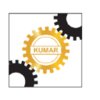Filter interviews by
Newmont Instrument Engineer Interview Questions and Answers
Newmont Instrument Engineer Interview Experiences
1 interview found
I applied via Walk-in and was interviewed before Jul 2023. There were 2 interview rounds.
(2 Questions)
- Q1. What is a pressure gauge
- Ans.
A pressure gauge is a device used to measure the pressure of a fluid (liquid or gas) in a system.
Pressure gauges typically consist of a dial with a needle that indicates the pressure reading in units such as psi, bar, or kPa.
They are commonly used in industrial processes, HVAC systems, automotive applications, and medical equipment.
Pressure gauges can be analog or digital, with analog gauges being more traditional and ...
- Q2. What will you advice on safety
- Ans.
Always prioritize safety in all aspects of work to prevent accidents and injuries.
Regularly conduct safety training sessions for all employees
Ensure all equipment is properly maintained and inspected
Encourage open communication about safety concerns
Follow all safety protocols and procedures without taking shortcuts
(2 Questions)
- Q1. What is a pressure guage
- Ans.
A pressure gauge is a device used to measure the pressure of a fluid (liquid or gas) in a system.
Pressure gauges typically consist of a dial with a needle that indicates the pressure reading in units such as psi, bar, or kPa.
They are commonly used in industrial processes, HVAC systems, automotive applications, and medical equipment.
Pressure gauges can be analog or digital, with some models also featuring alarms or data...
- Q2. What will you advice on safety
- Ans.
Always prioritize safety in all aspects of work to prevent accidents and injuries.
Regularly conduct safety training for all employees
Ensure all equipment is properly maintained and inspected
Encourage open communication about safety concerns
Follow all safety protocols and procedures
Provide necessary personal protective equipment (PPE)
Implement a 'stop work' policy if any safety concerns arise
Interview Preparation Tips
Top trending discussions






Interview questions from similar companies

Instrumentation Technician Interview Questions & Answers
First Quantum Mineralsposted on 19 Dec 2024
I applied via Walk-in and was interviewed before Dec 2023. There were 4 interview rounds.
(3 Questions)
- Q1. Tell us more about your self.
- Ans.
I am a dedicated and experienced instrumentation technician with a strong background in troubleshooting and maintaining various types of equipment.
Over 5 years of experience in the field of instrumentation technology
Proficient in reading and interpreting technical drawings and schematics
Skilled in calibrating and repairing instrumentation equipment such as pressure gauges, flow meters, and temperature sensors
Strong kno...
- Q2. Your Salary Expection.
- Ans.
My salary expectation is in line with industry standards and reflects my experience and qualifications.
Research industry standards for Instrumentation Technicians in the area
Consider your level of experience and qualifications
Be prepared to negotiate based on job responsibilities and benefits offered
- Q3. Any thing you would like to ask,
(3 Questions)
- Q1. What is live zero?
- Ans.
Live zero is a term used in instrumentation to refer to a situation where the instrument reads zero when the input signal is zero.
Live zero ensures that the instrument is accurately measuring the input signal without any offset or error.
It is important for ensuring the reliability and accuracy of the instrument readings.
Examples include pressure gauges that should read zero when there is no pressure applied, or tempera...
- Q2. Tell us how you go about your day at your work place.
- Ans.
I start my day by reviewing the schedule, checking equipment, performing maintenance tasks, troubleshooting issues, and documenting work done.
Review the schedule for the day
Check equipment for any issues
Perform maintenance tasks as needed
Troubleshoot any instrumentation issues that arise
Document work done for record keeping
- Q3. In most cased questions are based on the Cv and work sinario.
(4 Questions)
- Q1. What is safety?
- Ans.
Safety is the practice of preventing accidents, injuries, and hazards in the workplace.
Safety involves following proper procedures and protocols to minimize risks
It includes using personal protective equipment (PPE) when necessary
Regular maintenance and inspections of equipment and machinery are essential for safety
Safety also involves proper training and communication among team members
Examples: wearing a hard hat in ...
- Q2. What is a hazard?
- Ans.
A hazard is a potential source of harm or danger that could cause injury, damage, or loss.
A hazard can be a physical condition, activity, or substance that has the potential to cause harm.
Hazards can be classified into categories such as biological, chemical, physical, ergonomic, and psychosocial.
Examples of hazards include slippery floors, toxic chemicals, loud noises, heavy lifting, and workplace stress.
Identifying a...
- Q3. Distinguish a near miss and an Accidend and an ancident.
- Ans.
Near miss is a potential accident that did not result in injury or damage, accident is an unplanned event that results in injury or damage, incident is any event that disrupts normal operations.
Near miss is a close call where an accident almost happened but was avoided.
Accident is an unplanned event that results in injury, damage, or loss.
Incident is any event that disrupts normal operations, regardless of outcome.
Exam...
- Q4. What is a risk?
- Ans.
A risk is the potential of gaining or losing something of value. It involves uncertainty and the possibility of negative outcomes.
Risk is inherent in any decision or action taken.
It involves assessing the likelihood of an event occurring and the potential impact if it does.
Examples include financial risks, safety risks, and health risks.
What you ever worked in the substation? if yes tell us the proceddure and requirments for working in the substation
Interview Preparation Tips

Manager Electrical & Instrumentation Interview Questions & Answers
Hindalco Industriesposted on 16 Apr 2022
(1 Question)
- Q1. Vfd, plc, instrumentation. Project or maintenance
(1 Question)
- Q1. Six sigma, why do you want to join
Interview Preparation Tips
Newmont Interview FAQs
Tell us how to improve this page.
Interview Questions for Popular Designations
- Instrumentation Technician Interview Questions
- Control & Instrumentation Engineer Interview Questions
- Instrumentation Supervisor Interview Questions
- Manager Instrumentation Interview Questions
- Senior Instrument Engineer Interview Questions
- Instrument & Control Engineer Interview Questions
- Senior Instrumentation Technician Interview Questions
- QC Inspector Instrumentation Interview Questions
- Show more
Newmont Instrument Engineer Interview Process
based on 1 interview
Interview experience
Interview Questions from Similar Companies

African Industries

Rio Tinto

Imerys

Oswal Castings
- Home >
- Interviews >
- Newmont Interview Questions >
- Newmont Instrument Engineer Interview Questions










